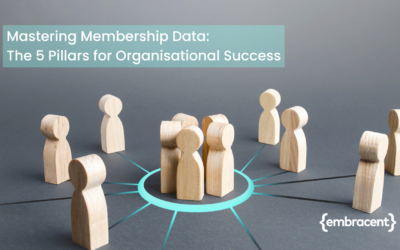In this podcast we discuss the opportunities that technology brings. We also discuss the more strategic challenges that we have as business and technology leaders in these very uncertain times.
Participants

Avril Chester (AC)
Interim Executive Director for Data and Technology at RIBA

Aaron Powell (AP)
Chief Digital and Data Officer at UCAS

Mark Lockton-Goddard (MLG)
CEO of embracent Ltd and Interim CIO
Hosted by Mark Chillingworth (MC)
Firstly, can you please tell me a little about your companies:
Avril (AC)
RIBA is well known for being a global professional membership body. We champion architecture for stronger communities. I’m sure many of you are familiar with our awards and prizes such as the Sterling Prize. What you might now know is that we are heading towards our 200th anniversary and also have a collection of over 4m drawings etc. It’s a really fascinating organisation and I’m excited to be part of it.
Aaron (AP)
UCAS is an admission service for undergraduate and post-graduate UK higher and further education. Our aim is to inspire and empower people to make aspirational choices about higher education and learning. We are an independent charity with a commercial subsidiary. Every year we help around 700k students from over 200 countries apply to full time undergraduate courses at nearly 400 UK universities and colleges.
Mark (MLG)
We are a niche consulting firm that helps businesses embrace new technology. Our aim is to help businesses be more successful by using better and cheaper technology – improving the future of work for everyone. Businesses can’t always afford to attract the right talent, and they don’t like sales drive consulting organisations. They want pragmatic hands-on advice and that’s what we offer.
Today’s debate is on the topic of Efficiency.
In what we hope will be the closing stages on this pandemic, is now the wrong or the right time to talk about efficiency, and how do we do this without just cutting headcount?
AP: We have had to adapt quickly to continue to deliver values to our customers. To make sure that we are properly set up for the future. My question would be “Efficiency for what”? If simply to take out cost, then long term business stability could be affected. This is about how we organise ourselves and create a platform for growth.
The pandemic has forced us to work differently and has shown that we can. It has helped us to bring forward other ideas and thinking.
AC: You should never stop thinking about efficiency. Efficiency should not be seen as a bad thing – it’s something that you should always consider.
The pandemic has drawn out the opportunity to experience and try news ways. We have created a Fast Track team to try new things – driver change at speed, check the impact, learn from the data and reconsider.
It is important to keep learning and growing and you don’t have to have perfect data. You have amazing data just where it is. So, use it.
Use the data that you already have so that your decisions can be data driven. Don’t worry about perfection but focus getting things done and improving efficiency.
MLG: Some people spell efficiency “cost reduction”. They are really asking “how do I take cost out of the business”. A sole focus on cost reduction can de-stabilise a business and cause challenges of the future. Avril said this really well – that efficiency should be a consistent focus. Organisations are adopting new ideas very quickly. Previously they might have discussed these for months before doing anything.
When the pandemic hit, many businesses where just in survival mode. More mature businesses are now beginning to adapt and innovate – rather than just cut cost. However, sadly, some businesses are still just looking at headcount reductions.
How is the resilience of the organisation and how do you increase efficiency whilst also maintaining resilience?
AC: At 200 years there might be an assumption that we can’t change quickly. This challenge has given us the opportunity to showcase our flexibility and openness at RIBA. To have new ideas and use our imagination. It’s very exciting to be a part of and a delight. The team have been wonderful in turning things around and being open to change.
AP: The team at UCAS have also been fantastic; being flexibly and providing a 1st class service. They are having to respond to uncertainty – for students and how exam results are going to be calculated – whilst also maintaining a focus on giving good quality advice.
We are coming up to a very busy time of year for the business. It’s always important to put the customer at the heart of all that we do – whilst also looking at how to do things differently and be flexible. To manage the high demand on our systems and services, to react, be flexible and do things differently but at the same high quality.
Sometimes cost reduction is unavoidable. Does it always need to affect headcount?
MLG: I’d like to say headcount is always the last thing to consider and for many that is the case. Sadly, however, some think it’s an easy fix instead of dealing with more structural issues.
We advise our customers to look at other issues such as cost reduction in network costs, licensing costs and third-party SLAs etc. But this is sometimes hard for businesses to do, so they count headcount and look for percentage reductions.
Organisations can do more to reassign people – to innovate and think differently. This way they can drive top line growth as well as bottom line.
AP: Its always temping for businesses to look for easy savings and have seen this in the past. We are focusing on re-shaping contracts and SLAs to generate efficiencies, not just headcount.
We are constantly looking for more customer insight – to help us move at pace. Change is inevitable and continually a part of what we need to manage.
AC: Our CEO and exec team have driven the organisation to focus on everything other than headcount. It has affected us; our members as well as the events we run. We are involving members in ideation sessions and have run competitions to come up with ideas for the future. We are constantly looking to see how we can help our members be more successful.
Automation is vital for businesses to thrive in the future. You’ve all had careers in data. How critical is data in the automation journey?
AP: We have quite a lot of data and we automate the flows of data as efficiently as we can. We are constantly looking to understand the data and generate insights. Data is just a raw material – it’s about how you use it to gain insights and drive value.
Automation is important but you have to be careful what you automate. If you only focus on quick wins, you may not address the underlying issues.
MLG: Data is important, and data driven decisions are key. Many organisations are not short of data, but that doesn’t mean they make great decisions. Often, it’s about whether you understand what you want the data for and where the value is.
Lots of things are happening with automation e.g. single pane of glass – an overlay on many systems to provide a nerve centre view. Each automation case needs a mini-business case to make sure its sensible.
We often use automation to create headroom for people to solver bigger problems. Automation is not about technology, but about understanding what you are trying to achieve.
AC: There is a lot more interest in automation, but a nervousness from the past. Now, especially in not-for profit, there is more of an appetitive to give it a go. To try it out.
Automation makes us think of Hollywood movies, but it’s not like that. It gives you the headspace to focus on the right questions.
So how do you create capability in the business to respond and react?
AP: First it’s important to understand what you are reacting to. We have a very strong focus on understanding the customer voice, and we are constantly asking how we can deepen our customer insight and understand their pain points. Better data on customer experiences are key so that we can react and change. We are now shaping teams to have real ownership and empowerment with their products. That way we have a direct link between a customer need and our team’s response – and they are empowered to react and respond.
AC: From RIBA perspective we have been fortunate to be working more globally, so we can share experiences across the world. We have been sharing lessons from our members in China, as they came out of lockdown early. By sharing lessons learned across the world, removing the jargon, removing the fear and encouraging a ‘give it a culture’.
We understand that not everything will work, but with a good customer feedback loop we can keep learning and improving.
MLG: Research says we need a clear ‘why’ statement. A clear vision – something that we and our customers care about. Organisations have done well to distil why their organisation is different and communicate it. People want a clear vision and the ability to work within that, to make mistakes, and to learn.
We talk a lot about being curious. Having with a clear mandate from the top and freedom to operate.
We encourage people to be curious and ask questions that start with “why do we always” and “why do we never”
So, it’s important to be the 3yr old in the room. However, can that curiosity be stifled by business processes that can’t adapt?
AC: Yes it can. Sometimes you don’t realise that the process is the blocker. Work is intense now and there is a very fast pace. You might not realise that poor processes are getting in the way. It takes someone to be that 3yr old – to help us look at things from a fresh perspective.
AP: It’s about knowing when to step back and ask questions. Being curious. Processes tend to grow and morph over time, with one imperfect process meaning you need another two to manage the exceptions and so on. We need time to step back and not keep adding to the complexity. Asking, if we were starting today, “Would we start from here”?
MLG: Processes are by their nature, repetitive. However, like grooves in the field that a tractor makes – they can be hard to get out of. That’s why it’s important to create headspace in a business to continuously innovate and improve. You need a 3-year-old to point out the grooves.
Has the pandemic been that 3-year-old in the room – constantly asking why?
AC: Without a shadow of doubt. The importance of purpose and also the need to have a diversified business to avoid exposure.
Publishing is having it very hard due to lack of diversity. They are very exposed as businesses although the more diversified businesses have responded very well.
MLG: On the flipside, a senior business leader recently said that the pandemic had given his business the remit to diversify when previously he wouldn’t have been able to. Shareholders would have blocked earlier diversification – seeing it as an unnecessary distraction for a successful business.
AP: Some businesses are in denial and thinking that things will revert back to normal. They think “we have done digital transformation because people can work from home” but this is not going to be enough. We must continue to challenge to respond and adapt. As leaders, we need to set the level of ambition.
Can you create a culture that is adaptable and efficient?
MLG: Culture is the most important thing – and comes from strong vision, values, principles. We are fortunate because we are a young business. We have hired on values and set a clear view of what we do and why we do it. You can do this by having a strong culture and being curious – by staying close to customers.
AC: It’s a dream! I’m not sure that you can because it suggests an end date. We need to continuously improve and strive for this aspiration.
AP: Its always work in progress. Within the broad meaning of efficiency, we can take steps towards it. Values are key and living them is important. Being clear what we are here for is important.
It’s being a fascinating discussion. What are your main takeaways from this session?
AC: I’m going to champion my inner 3-year olds. I also take heart that we are all on the same journey. We need to keep trying and learning. I will continue to encourage questions and continuous improvement
AP: That sometimes tactical is good to give people the headspace to think about bigger challenges. I’ll be thinking about how to give the team some headspace.
MLG: That this time gives us an opportunity to re-invent. Diversity of thinking (being a 3-year-old) is important to keep re-inventing and identifying new opportunities.
Thank you.

Mark Lockton Goddard
Other Interesting Reads
AI for Onboarding: A glimpse at the not-so-distant future for HR Directors
Artificial Intelligence (AI) has experienced a breakthrough year in 2023. But how we embrace AI and Machine Learning (ML) without losing sight of the bigger picture – and how we can be “better together” – is a conversation that we should all be having.
With that in mind, we invite you to see how AI has impacted Santa Clause this year in our short Christmas video.
embracent Christmas Video 2023
Artificial Intelligence (AI) has experienced a breakthrough year in 2023. But how we embrace AI and Machine Learning (ML) without losing sight of the bigger picture – and how we can be “better together” – is a conversation that we should all be having.
With that in mind, we invite you to see how AI has impacted Santa Clause this year in our short Christmas video.
Mastering Membership Data: The Five Pillars for Organisational Success
Explore how understanding members, aligning services, monitoring member activity, optimising internal operations, and tapping into external insights can revolutionise your organisation’s performance.



